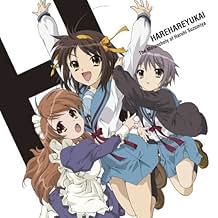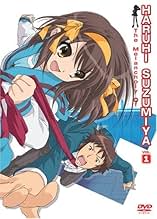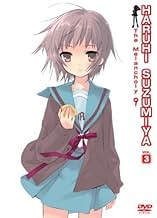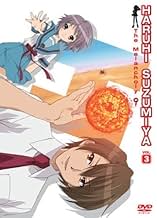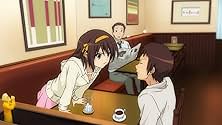The Melancholy of Haruhi Suzumiya
Original title: Suzumiya Haruhi no yûutsu
The crazy adventures of the SOS Brigade, led by the insane but charismatic Haruhi.The crazy adventures of the SOS Brigade, led by the insane but charismatic Haruhi.The crazy adventures of the SOS Brigade, led by the insane but charismatic Haruhi.
- Awards
- 2 wins total
Browse episodes
Storyline
Did you know
- TriviaOriginally, the episodes were intentionally aired/shown out of sequence. What was shown as Episode 01 is actually Episode 11. In the 'coming soon' blurb at the end of each episode, Haruhi gave the chronologically correct number of the next episode, and Kyon 'corrected' her by giving the 'wrong' episode number - the one that corresponds to the order it is being shown in. When new episodes were produced in 2009, the whole series aired again, this time in chronological order.
- Quotes
[Haruhi has been told that her plot to frame the Computer Brigade leader of harassing Mikruru will fail because so many witnesses will deny it]
Haruhi Suzumiya: Then I'll tell everyone you thugs gained up on her and
[bleep]
Haruhi Suzumiya: ed her!
- Crazy creditsThe Character Haruhi Suzumiya is listed as ULTRA DIRECTOR.
- Alternate versionsFor home video release and the 2009 re-run in Japan, newly animated scenes were added to some first season episodes to make them more faithful to Nagaru Tanigawa's novel.
- ConnectionsFeatured in Adventures in Voice Acting (2008)
Featured review
Okay, let me start off by saying that, on the whole, I don't like anime very much. I've enjoyed a couple of the oft-cited "classic" series, but regard the medium as a whole in exactly the same way that I do American television: namely, that a good 90-95% of it is utter tripe, with the remainder falling anywhere from "watchable" to "decent." This being the case, it's no wonder that I don't like the self-deprecating anime parodies out there. I don't get most of the jokes, and the medium itself enforces a certain style of humor that doesn't appeal to me at all - loud, hyperactive, lowbrow, and completely over the top.
So, when I started watching this series at the behest of a friend, I was primed for disappointment after the first couple of episodes. I figured that the characters were supposed to represent cliché characters from shopworn story outlines, and that their actions were supposed to be similarly satirical. I could kind of see where it was coming from, but didn't think that it was all that clever - lots of "wacky, fun-filled high-school shenanigans and goings-on, only now we're being ironic about it." At about the third episode, my opinion drastically changed.
It was at that point that the strengths of this series started to manifest themselves. The quirks of the non-chronological episode order, its snarky sense of self-awareness, and, above all, clever humor with (gasp) a well-executed straight man.
In what I consider to be a rarity in any medium, this show presents well-thought out, witty interactions between diametrically opposed characters. Protagonist Kyon's perpetual sense of vaguely annoyed resignation provides the perfect foil to the actions of title character Haruhi's generic "anime-like" exploits. It's a break from formula, and it works incredibly well.
Based on that strong foundation, the series further succeeds with a truly phenomenal level of attention to detail. As previously stated, the episodes air out of chronological order. I considered this to be a gimmick at first, but it works surprisingly well. The chronological sequence of events makes sense logically, but the aired order of the episodes more closely follows the traditional structure of Aristotelian drama. The order chosen leaves no narrative gaps that cannot be filled by simple inference (but while it is possible to guess what happened in an unaired "preceding" episode, one still feels compelled to watch exactly how those events unfold), and superb planning prevents any plot holes or contradictions. I watched this series a second time immediately upon completing it the first time, and I was amazed at how well even seemingly inconsequential events were all tied together.
The last point is indicative of the extreme attention to detail in every area of the series. While the stock "anime" character designs grate a bit, the background art is exquisite, realistically rendered based upon actual photographic references. Animation quality is also excellent at important points. For example there is a musical performance late on in the series in which the characters are shown actually playing a song - this may sound trivial, but the subconscious effect of watching (film-quality) animation which actually corresponds to the soundtrack is incredible.
In short, I love this series for some reason. By its very nature it is something that I generally dislike, but its execution is so unique and well-carried out that I can't help it.
So, when I started watching this series at the behest of a friend, I was primed for disappointment after the first couple of episodes. I figured that the characters were supposed to represent cliché characters from shopworn story outlines, and that their actions were supposed to be similarly satirical. I could kind of see where it was coming from, but didn't think that it was all that clever - lots of "wacky, fun-filled high-school shenanigans and goings-on, only now we're being ironic about it." At about the third episode, my opinion drastically changed.
It was at that point that the strengths of this series started to manifest themselves. The quirks of the non-chronological episode order, its snarky sense of self-awareness, and, above all, clever humor with (gasp) a well-executed straight man.
In what I consider to be a rarity in any medium, this show presents well-thought out, witty interactions between diametrically opposed characters. Protagonist Kyon's perpetual sense of vaguely annoyed resignation provides the perfect foil to the actions of title character Haruhi's generic "anime-like" exploits. It's a break from formula, and it works incredibly well.
Based on that strong foundation, the series further succeeds with a truly phenomenal level of attention to detail. As previously stated, the episodes air out of chronological order. I considered this to be a gimmick at first, but it works surprisingly well. The chronological sequence of events makes sense logically, but the aired order of the episodes more closely follows the traditional structure of Aristotelian drama. The order chosen leaves no narrative gaps that cannot be filled by simple inference (but while it is possible to guess what happened in an unaired "preceding" episode, one still feels compelled to watch exactly how those events unfold), and superb planning prevents any plot holes or contradictions. I watched this series a second time immediately upon completing it the first time, and I was amazed at how well even seemingly inconsequential events were all tied together.
The last point is indicative of the extreme attention to detail in every area of the series. While the stock "anime" character designs grate a bit, the background art is exquisite, realistically rendered based upon actual photographic references. Animation quality is also excellent at important points. For example there is a musical performance late on in the series in which the characters are shown actually playing a song - this may sound trivial, but the subconscious effect of watching (film-quality) animation which actually corresponds to the soundtrack is incredible.
In short, I love this series for some reason. By its very nature it is something that I generally dislike, but its execution is so unique and well-carried out that I can't help it.
- Vorn_the_Unspeakable
- Sep 16, 2006
- Permalink
- How many seasons does The Melancholy of Haruhi Suzumiya have?Powered by Alexa
Details
- Release date
- Country of origin
- Official sites
- Languages
- Also known as
- The Melancholy of Haruhi Suzumiya: Second Season
- Production companies
- See more company credits at IMDbPro
Contribute to this page
Suggest an edit or add missing content



